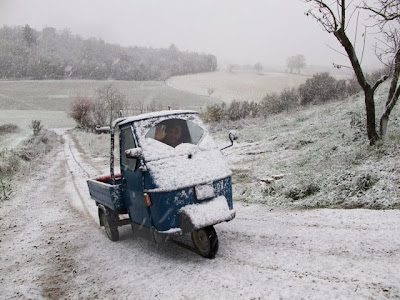One of the reasons I stayed in Italy until the last day of the year was to participate in one of the most important and certainly the last of agricultural rituals in the annual cycle of rural Tuscan life -- the slaughtering of the family hog.

I'd waited for nearly a year and in November, when I asked Giovanni when it would happen, he answered in his raspy Tuscan dialect: "Around Natale (Christmas), maybe Capo d'Anno (New Year's Day). It has to be cold."
I said I wanted to help him do it, wanted to experience it alongside him and to document it. I asked him to promise he'd let me know when it would happen. He grinned at this. It wasn't his usual Errol Flynn "Welcome to Sherwood!" grin, but a limper, more introspective version. I now understand the enigma in that look.
Thinking the event was imminent because the weather had been unusually cold, Sally and I stopped by a few days before Christmas to ask when the slaughter would take place. Giovanni looked a little sheepish, then said it was already done. I asked when he'd done it and he said just that morning. The meat was hanging from the tractor boom in the barn. We could see it for ourselves if we wanted.
What we found suspended in the barn were two identical slabs of pork with the last bit of blood dripping from the cloven snout. Giovanni had introduced me to this same white hog one year earlier, just as I was starting this blog. He fed it corn and petted its snout and spoke sweetly to it. Milena fed it slops from her kitchen. It lived in a very nice pigsty, actually a small house with windows and a tile roof which it shared with another black hog. When I asked how much food was hanging there, Giovanni said half of the carcass would feed his family for half the year, the other half would feed his cousin's family for just as long. Then I asked why he hadn't alerted me so I could participate.
Giovanni dropped his voice apologetically. His eyes moistened slightly. "E brutto," he muttered. It's ugly. He meant the slaughter.
I understood. It is a very personal thing. He hadn't really wanted me to watch as he spoke softly to to the hog, saying his thankful good byes before he shot it in the head. I respect this very much. I hadn't helped raise this animal. I hadn't fed it scraps from my own table. Giovanni and Milena and Arnaldo really live with their animals. They treat them well while they are alive, then they kill them as humanely as possible to put food on their table. I'm sure there are struggles and messes and mistakes, just as there are when we raise our own children, but it's a natural permacultural cycle involving interdependently evolved domestic animals (us and them) both of whom -- at least in the case of close-to-the-land folk like the Mangiavacchis -- enjoy a far higher standard of living, and in many cases longer and healthier lives, than they would if disconnected from their hosts in the wild. Which brings me to my New Year's thought.
Without connection, there can be no respect. Yet most of us in the developed world live at a disconnect to the food we put in our bodies. We think meat is something that comes from a supermarket and most of us who eat it don't even know we are unplugged. Some of us stop eating it when we realize it was once a living animal -- a reactive and equal disconnect in many ways. The fact is, with the exception of rock-eating extremophile bacteria, every living creature must eat living things to live. Even plants depend on the nitrogen that comes from animal kingdom protein, some of it from us when we die and re-enter the planet-wide cycle of life (if we haven't stingily pickled ourselves and hermetically sealed our nutrients in aluminum coffins). I'm sure some people have already looked at the picture above and thought it repellant and stopped reading. For those who haven't, I want to say it is a portrait of the admirable and connected conscientiousness Giovanni and his family practice. And a reminder that, whether or not we chose to sustain ourselves by eating animal flesh, we could all stand to be more connected and to better respect the living things that die to keep us living in this amazing worldwide ecological niche we human beings occupy and share.
Happy New Year, Earthlings!





